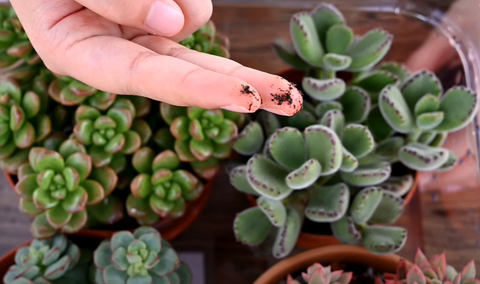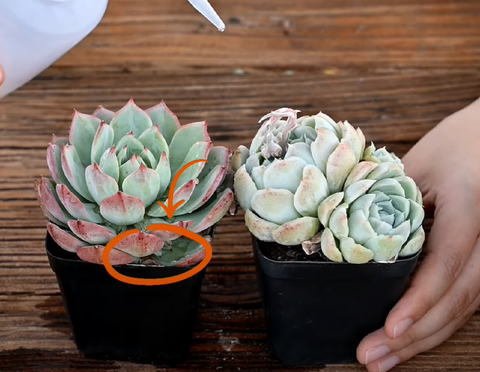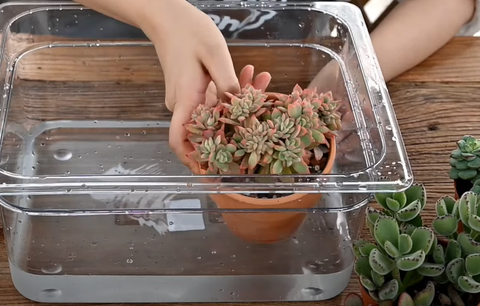When it comes to taking care of the succulents, you don't have to do many efforts, thanks to the hardy and surviving nature of the succulents. All you have to do to keep your succulent flourish and glowing is keep them in bright light and water them properly. But the first question that pops up in mind is how to water them properly without over or under watering them? Because improper watering, especially overwatering, can kill your beautiful succulent. But don't worry, "Bottom Watering" can save you from these problems.
So keep reading this article to learn what is bottom watering, when and how to bottom water your succulent, and the benefits of bottom watering.
What is Bottom Watering?
As the name indicates, it is the watering of your succulent from the bottom by placing a succulent pot into a bottom watering tray. So what does it mean? Instead of pouring water from the above, the succulent pot having at least one drainage hole at the bottom is placed in a tray containing water; the succulent potting soil will absorb the water from the tray as per its requirement.
How to do Bottom Watering?
Bottom watering your succulent plants is a quite simple technique. All you need is a bottom watering tray or a large basin and water. Follow the following simple steps to bottom water your succulent:
- 1. Fill the tray or basin with water to a height of approximately 2/3 of the potting succulents' height allowing the soil to thoroughly absorb moisture.
- 2. Place the bottom watering pot or simply called succulent pot, in the tray. Make sure that it should contain at least one drainage hole in the bottom of succulent pots. Otherwise, repot it into a bottom watering pot containing drainage holes.

- 3. Leave the pot in the tray for 3 to 20 minutes, depending on the size of the pot. The potting soil will absorb water from the tray as its requirement.
- 4. Wait until the top of the soil shows the sign of moisture.
- 5. Take the pot out of the tray and allow it to drain out any excess water to avoid root rot disease.
- 6. Place your succulent wherever you want. It's better to put them in a well-ventilated place.

When to Bottom Water your Succulent?
1. When the dimensions of the succulent plant exceed the size of the planter's opening.
Proper top watering of succulents may pose a challenge because there is no exposed soil into which to pour the water. Furthermore, even if the water fortunately touches the soil, the inside of the potting soil remains dry without full moisture, leading to an insufficient water supply for the roots. Bottom watering allows the thirsty roots and bone-dry soil mix to draw water from the outer pot like cotton from a bottom hole, ensuring plants get the hydration they need to thrive.

2. When the roots of succulents are long-established.
If the succulent's root system is still relatively short, or if you have recently repotted it with a new pot and soil, it is not recommended to water it from the bottom. Even with bottom watering, the roots may not have enough strength to absorb water. This is because the root system is relatively sensitive and fragile during this time, which makes it more prone to root disease. Therefore, bottom watering is better for succulents with longer roots and stable growth.
According to tests from succulent nursery, bottom watering is used to provide moisture to succulents, which is conducive to extending the succulent roots downward and exercising the strength of the root system. Succulents growing in the same environment will look better.
3. Bottom watering can effectively prevent moisture-sensitive succulent varieties from rotting.
Certain succulent varieties, such as Echeveria Ice Green, Echeveria Laui, and Echeveria Monroe, are sensitive to air and pot soil humidity. To prevent their leaves from getting wet from excess water, these varieties can be watered from the bottom instead of the top. This method allows water to be supplied from the bottom upwards, which ensures that the surface layer of pot soil contacted by the bottom leaves is not overly moist. Bottom watering is ideal for this type of species.
4. Bottom watering is an ideal method for summer care of succulents.
During summer, people often need clarification about how to water succulents. Bottom watering succulents after sunset is an efficient method to help succulents survive from overwatering. Additionally, placing the pot in shallow water can also help to reduce the temperature of the pot. The succulent will not be burdened with calories when drinking water, which is more conducive to the growth of the succulent.
5. Bottom watering can be an effective method to rehydrate severe-dehydrated succulents.
In instances where succulents are severely dehydrated, bottom watering is a highly effective method to restore their plumpness within a relatively short period. Typical examples are succulents of the Pachyphytum and Haworthia cooperi succulents.
6. When using liquid fertilizer for succulents.
When using liquid fertilizer for succulents, diluting the fertilizer with water is essential. Top-watering succulents are prone to leaving the liquid fertilizer on the leaves and causing burns. Bottom watering ideally avoids this issue. Additionally, the potting soil will be thoroughly soaked with diluted liquid fertilizer with water.
You may wonder: How to Fertilize Succulents Scientifically
Some matters needs attention
Here are some matter need your attention when bottom watering the succulents:
1. Avoid bottom watering newly planted succulents as they are still establishing their root systems.
For newly planted potted succulents or other indoor plants whose root systems still need to be established, bottom watering may not help them absorb more water. Moreover, the soil in the pots of newly planted plants is usually loose and very light. If the water volume is not controlled well, the topsoil will often overflow from the pots.
2. Control the water volume and learn from practices.
Different flower pots and plants have varying abilities to absorb water. When bottom watering succulents for the first time, it is recommended to use a shallow container to control the amount of water. This makes it easier to observe the watering process and manage multiple potted plants simultaneously, saving time. You will become proficient in this method with practice, and any container holding water will be accessible.
3. Don't leave the succulents sitting in water for too long.
Bottom watering is a recommended method for rapidly rehydrating succulent plants' roots. However, excessive exposure of the roots to wet soil can result in root shock, an undesirable condition. Therefore, limiting the soaking duration to 3-20 minutes is imperative, depending on the size of the potted succulents. After the stipulated duration, removing the potted succulents from the water is advisable to avert any further damage.

4. Bottom watering large succulents can be challenging.
When dealing with large and weighty potted succulents, the bottom watering method can be quite challenging for a single person to execute. Furthermore, it requires a substantially larger external water container. In such a scenario, it is advisable to seek assistance from someone physically strong at home. Alternatively, you may consider using the top watering technique to water your succulents instead.
5. Avoid exposing the succulents to direct sunlight immediately after bottom watering.
After water bottoming the succulents, the stems and leaves are usually full of water. Exposing the succulents to direct light immediately can cause the leaves to crack or sunburn. In particular Haworthia cooperi, Haworthia Duval, and Haworthia truncata, the top of leaves may even "explode."
Conclusion
Whilst bottom watering succulents may not be the most convenient method, its benefits are significant. This method is highly effective in protecting the white powder present on the leaves of succulents, whilst also preventing over-watering that can lead to plant death. Furthermore, bottom watering facilitates the development of a robust root system in succulent plants, making them more adaptable to external changes and promoting better growth.



























4 thoughts on “When and How to Bottom Water Your Succulents?”